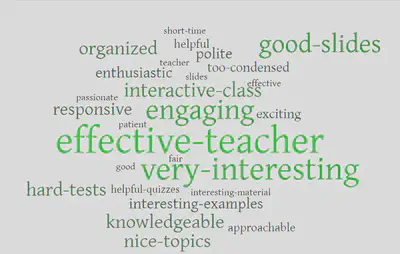Teaching
Teaching Approach
Teaching is a substantial part of my academic career, since not only has strengthened my interpersonal skills, but it has also been an extremely rewarding experience. This has come through my interactions with students, allowing me to help them navigate the courses I taught. The guiding principles of my teaching activity are fostering curiosity and critical thinking, and highlighting the importance of scientific inquiry. Consequently, I prioritize creating a stress free environment, promoting student interaction, and engaging them with the topic being discussed bringing “real-work examples”, interesting facts and interactive content and lecture presentations. I have notice over the years that the more dynamic a curse is, the more thought-provoking questions students ask, and the easiest they grasp the course content. The organization of the course is another aspect I focus on, ensuring to communicate effectively the course syllabus and schedule, clearly outlining learning goals, important dates and assessment methodology.
Looking towards the future, research within the geoscience realm has become more complex and integrated, and as such, higher education courses should reflect this complexity. I am always passionate to teach geoscience courses which provide students with the knowledge to better understand the interlinks among the biological, physical and chemical spheres, and the Earth interphases (land-river-ocean-atmosphere continuum).
Teaching Experience
I have been teaching at university level for nine years, starting early in my bachelor degree, throughout my Ph.D., and then after my graduation as a sessional instructor. The courses I have taught span a wide range of geoscience topics (e.g., oceanography, chemical oceanography, earth processes, climate change), as well as levels, from first year introductory courses to upper level ones. During this time, I have improved my teaching and communication skills and the ability to effectively interact with students, earning recognition from the Dean of the Faculty of Science for my strong numerical ratings (~4.5 of 5.0) and positive student evaluations and feedbacks. Additionally, in 2017 I was awarded with the Outstanding Teaching Assistant Award by the Earth, Ocean and Atmospheric Sciences department at the University of British Columbia. My teaching evaluation feedbacks are summarized in the figure below.

Courses Taught
| University | Course Name | Role | Hours/Week | Class Size | Date & Sessions |
|---|---|---|---|---|---|
| William & Mary / VIMS | MSCI 401b: Fundamentals of Chemical Oceanography | Instructor | 20 | 15 | 2025/01-2025/05 (1 term; Spring) |
| University of British Columbia, Canada | EESC 106: The Catastrophic Earth | Sessional Instructor | 20-40 | 45-79 | 2020/07-2021/08 (4 terms; Fall, Spring & Summer) |
| University of British Columbia, Canada | EESC 303: Oceanography | Sessional Instructor | 10-25 | 37-45 | 2020/07-2021/08 (2 terms; Fall & Spring) |
| University of British Columbia, Canada | EOSC 442: Climate Measurement and Analysis | Co-coordinator & Graduate Teaching Assistant | 4 | 30-40 | 2014/09-2018/04 (8 terms; Fall & Spring) |
| University of British Columbia, Canada | EOSC 315: The Ocean Ecosystem | Graduate Teaching Assistant | 8 | 105 | 2016/01-2016/05 (1 term; Spring) |
| University of British Columbia, Canada | EOSC 114:The Catastrophic Earth | Graduate Teaching Assistant | 6-12 | 180-250 | 2014/09-2019/12 (14 terms; Fall, Spring & Summer) |
| National University of La Plata, Argentina | Second year course: Introduction to Taxonomy | Ungraduate Teaching Assistant | 4 | ~30 | 2011/02-2013/09 |